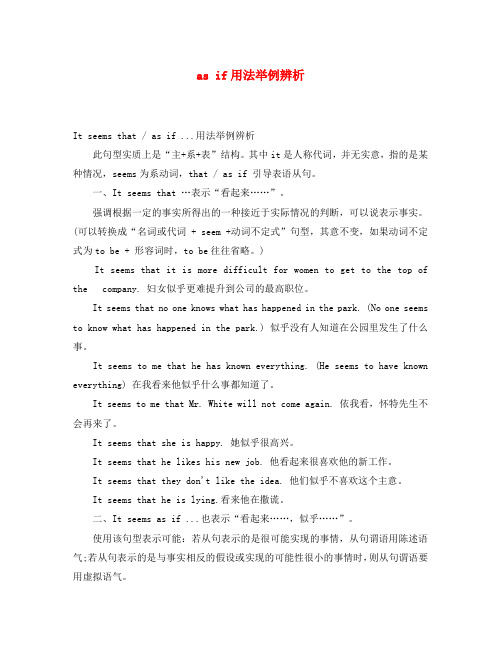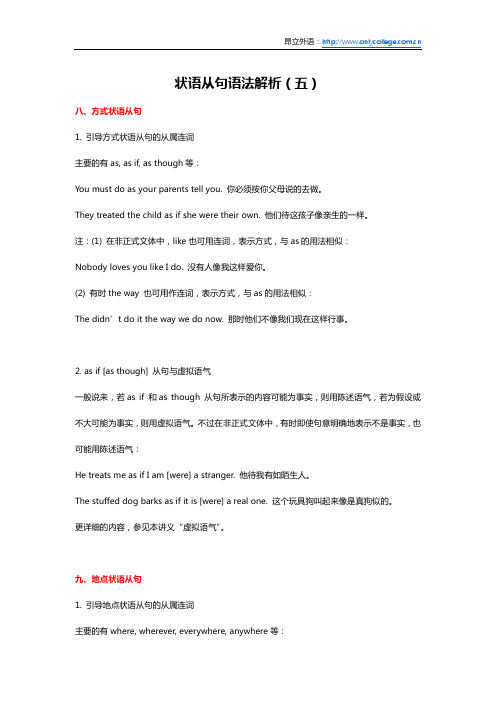as_if__用法解析
- 格式:ppt
- 大小:153.50 KB
- 文档页数:21

as的用法及短语AS,作为一个英语词汇,有着丰富多样的用法和短语。
它可以作为介词、副词、连词和缩写,用法灵活多变,下面将对其中一些常见的用法及短语进行详细解析。
一、作为介词的用法1. 表示身份、职业或角色AS可以用来表示某人的身份、职业或角色。
例如:- He works as a teacher.(他以老师的身份工作。
)- She served as the company's CEO for ten years.(她担任公司首席执行官长达十年。
)2. 表示时间AS可以用来表示某个特定的时间点或时刻。
例如:- Let's meet at the park at 5 o'clock, as agreed.(按照我们之前约定的,请在五点钟在公园见面。
)- Our flight departs at 8:30 am, so we need to arrive at the airport at least an hour before, as instructed.(根据指示,我们的航班上午8点30分起飞,所以我们需要至少提前一小时到达机场。
)3. 表示原因AS也可以用来表示某个行动或事件发生的原因。
例如:- I couldn't sleep well last night as I had a lot on my mind.(昨晚我没睡好是因为心事重重。
)- She couldn't come to the party as she was feeling unwell.(她没能来参加派对,因为她身体不舒服。
)4. 表示方式或手段AS可以表达某个行动的方式或手段。
例如:- The children played hide and seek as they enjoyed running around.(孩子们玩捉迷藏,因为他们喜欢四处奔跑。
)- Please pay the bill as cash only, as credit cards are not accepted here.(请以现金支付账单,因为这里不接受信用卡。

as if用法举例辨析It seems that / as if ...用法举例辨析此句型实质上是“主+系+表”结构。
其中it是人称代词,并无实意,指的是某种情况,seems为系动词,that / as if 引导表语从句。
一、It seems that …表示“看起来……”。
强调根据一定的事实所得出的一种接近于实际情况的判断,可以说表示事实。
(可以转换成“名词或代词 + seem +动词不定式”句型,其意不变,如果动词不定式为to be + 形容词时,to be往往省略。
)It seems that it is more difficult for women to get to the top of the company. 妇女似乎更难提升到公司的最高职位。
It seems that no one knows what has happened in the park. (No one seems to know what has happened in the park.) 似乎没有人知道在公园里发生了什么事。
It seems to me that he has known everything. (He seems to have known everything) 在我看来他似乎什么事都知道了。
It seems to me that Mr. White will not come again. 依我看,怀特先生不会再来了。
It seems that she is happy. 她似乎很高兴。
It seems that he likes his new job. 他看起来很喜欢他的新工作。
It seems that they don't like the idea. 他们似乎不喜欢这个主意。
It seems that he is lying.看来他在撒谎。
二、It seems as if ...也表示“看起来……,似乎……”。

名校版英语经典句型考点解析状语从句中的虚拟语气用法1)由as if, as though 引导的方式状语从句由as if 或as though引导的状语从句可以用陈述语气表示可能符合事实的情况,也可以用虚拟语气表示与事实不符或与事实相反的情况。
a) 表示现在情况的虚拟用过去时。
You look as though you slept badly.你好像没睡好觉。
He looks as if he were young. 看样子他好像很年轻。
(表示不年轻了)试比较:He looks as if he is young. 看样子他好像很年轻。
(他就是年轻)The teacher treats the pupil as if he were her own child. 这位老师对待这位学生就像自己的亲生孩子一样。
Susan is walking slowly, as if she looked tired. 苏珊走得很慢,好像她很累似的。
He treats me as if I were a stranger. 他那样对待我,好像我是陌生人似的。
Why is he looking at me as though he knew me? 他为什么那样看我?像是认识我似的。
My elder sister talks to me as though she were my mother or my aunt. 我姐姐与我谈话时,口气就像我妈妈或阿姨一样。
I can remember our wedding as if it were yesterday.我们的婚礼我记忆犹新,就像昨天一样。
b) 表示过去情况的虚拟用过去完成时。
I felt as if my heart had stopped.我觉得好像我的心都不跳了。
I felt as though we had known each other for years. 我感觉我们好像认识多年了。

初二英语方式状语从句as if 和as though 用法单选题40题1.She talks as if she ______ a queen.A.isB.wasC.wereD.are答案:C。
本题考查as if 引导的虚拟语气,当与现在事实相反时,be 动词用were。
A、D 选项不符合虚拟语气用法;B 选项was 通常用于一般过去时,而这里是虚拟语气。
2.He acts as though he ______ rich.A.isB.wasC.would beD.were答案:D。
as though 引导虚拟语气,与现在事实相反用were。
A 选项不符合虚拟语气;B 选项was 不是虚拟语气的正确形式;C 选项would be 通常用于与将来事实相反的情况。
3.They look as if they ______ in a dream.A.areB.wereC.have beenD.had been答案:B。
as if 引导与现在事实相反的虚拟语气,be 动词用were。
A 选项不是虚拟语气;C 选项have been 和D 选项had been 分别用于现在完成时和过去完成时,与本题虚拟语气不符。
4.She smiles as though she ______ happy all the time.A.isB.wasC.wereD.would be答案:C。
as though 引导虚拟语气,与现在事实相反,be 动词用were。
A 选项不是虚拟语气;B 选项was 错误;D 选项would be 用于与将来事实相反的情况。
5.He behaves as if he ______ the boss.A.isB.wasC.wereD.would be答案:C。
as if 引导虚拟语气,与现在事实相反,be 动词用were。
A 选项不是虚拟语气;B 选项was 错误;D 选项would be 用于与将来事实相反的情况。

状语从句语法解析(五)八、方式状语从句1. 引导方式状语从句的从属连词主要的有as, as if, as though等:You must do as your parents tell you. 你必须按你父母说的去做。
They treated the child as if she were their own. 他们待这孩子像亲生的一样。
注:(1) 在非正式文体中,like也可用连词,表示方式,与as的用法相似:Nobody loves you like I do. 没有人像我这样爱你。
(2) 有时the way 也可用作连词,表示方式,与as的用法相似:The didn’t do it the way we do now. 那时他们不像我们现在这样行事。
2. as if [as though] 从句与虚拟语气一般说来,若as if 和as though 从句所表示的内容可能为事实,则用陈述语气,若为假设或不大可能为事实,则用虚拟语气。
不过在非正式文体中,有时即使句意明确地表示不是事实,也可能用陈述语气:He treats me as if I am [were] a stranger. 他待我有如陌生人。
The stuffed dog barks as if it is [were] a real one. 这个玩具狗叫起来像是真狗似的。
更详细的内容,参见本讲义“虚拟语气”。
九、地点状语从句1. 引导地点状语从句的从属连词主要的有where, wherever, everywhere, anywhere等:Put the m edicine where children can’t reach it. 把药放在孩子们拿不到的地方。
You can’t camp where [wherever, anywhere] you like these days. 如今你可不能随便在哪儿宿营。
Everywhere Jenny goes she’s mistaken for her sister. 无论走到哪个地方,詹妮都被误认为是她妹妹。

2012年6月1.Those flowers looked as if they hadn’t been watered for quite a longtime.As if 的用法:通常都要用虚拟语气,表示与现在的情况相反;但表示的情况是事实或极有可能是事实是则用陈述句语气。
有关情态动词的语法:情态动词 (Model Verbs) 又称为情态助动词 (Model Auxil-iaries).英语中助动词主要有两类:一是基本助动词,如have, do, be;二是情态助动词,如may, must, need等.情态动词与其他动词连用表示说话人的语气.情态动词可表达建议,要求,可能和意愿等.情态动词没有人称和数的变化.在大学英语四,六级考试中,情态动词部分重点测试以下内容:(1)情态动词+行为动词完成式(2)情态动词+行为动词进行式(3)情态动词+行为动词完成进行式(4)某些情态动词的特殊用法一,情态动词+行为动词完成式情态动词+行为动词完成式即"情态动词+ have + v-ed分词",表示对过去行为或动作进行推测,评论或判断.1. must have v-edmust have v-ed 表示推测过去某事"一定"发生了.其否定形式为:can't / couldn't have v-ed, 表示过去不可能发生某事.例如:1) Since the ditch is full of water, it must have rained last night.2) You couldn't have met my grandmother. She died before you were born.2. could have v-edcould have v-ed 表示推测过去某动作"很可能"发生了.例如:1)"The dictionary has disappeared. Who could have taken it?"2)"Tom could have taken it. He was alone yesterday."3.may / might have v-edmay / might have v-ed 表示推测过去某事"也许"发生了.may 比might 表示的可能性在说话人看来稍大些.例如:I can't find my keys. I may / might have left them at the school yesterday.4. ought to / should have v-ed 和 ought not to / shouldn't have v-edought to / should have v-ed 和 ought not to / shouldn't have v-ed 用于对已发生的情况表示"责备","不满",分别表示"本应该…"和"本不应该…".例如:1) With all the work finished, I should have gone to the party last night.2) You ought not to have made fun of him. He is not the one you laugh at but learn from.5. needn't have v-edneedn't have v-ed 表示过去做了某事,但没有做的必要, 意为"本没必要…".例如:You needn't have waken me up; I don't have to go to work today.注:表示推测过去某动作发生的可能性时,就表示的可能性程度而言,must最大,could其次,may更次之,might最小.例如:"I wonder how Tom knew about your past.""He must / could / may / might have heard of it from Mary." 二,情态动词+行为动词进行式情态动词+行为动词进行式(即情态动词+ be + v-ing形式),表示推测或评论某动作现在是否正在进行.例如:1) He must be playing basketball in the room.2) She may be staying at home.三,情态动词+行为动词完成进行式情态动词+行为动词完成进行式(即情态动词+ have been + v-ing 形式),表示推测或评论过去某动作是否正在进行或一直在进行.例如:1) They should have been meeting to discuss the problem.2) He may / might have been buying stamps in the post office when you saw him.四,某些情态动词的特殊用法1. need考试中主要测试 need 作情态动词与作实义动词的区别,对此,可参见表1.need 作情态动词时,后面跟不带to 的动词不定式,即 "need do".通常用在疑问句和否定句中,表示询问是否有"必要",其否定形式为needn't,表示"不必";疑问形式为Need … do 极少用于肯定句.例如:1) I don't think we need turn the light on at that time.2) Need you ride a bike to the school?真题:2011年6月Jane is tired of dealing with customer complaints and wishes that she______________________.(能被分配做另一项工作)2012年6月It is suggested that the air conditioner ______________.(要安装在窗户旁)should的型虚拟语气,表示主观愿望的词。
高中虚拟语气用法解析(完整版)一.虚拟语气在非真实条件句中的应用非真实条件句:if引导的条件状语从句,但是实现该条件的可能性极小或不可能实现1.表示与过去事实相反Eg.If my car had been more reliable,I would have driven to my office.2.表示与现在事实相反Eg.In fact,it is certain that we would not be able to understand it if we heard it today.3.表示与将来事实相反Eg.If you succeed,everything would be all right.Grace doesn't want to move to New York because she thinks if she were to live there,she wouldn't be able to see her parents.4.注意事项(1)W as不可以替代were,虚拟语气中,从句中be动词只有were(2)错综时间条件句:条件句的行为和主句行为发生的时间不一致,动词的形式按照主句和从句各自的时间调整。
Eg.If he had listened to me, he would not be in such trouble now. If it had not been raining too much, the crops would be growing much better.(3)虚拟条件句中的谓语动词含有were/ should /had 时,if可省略,而将were/ should /had 置于主语前面Eg.What would have happened had Bob walked farther as far as the river bank?Should he agree to go there, we should send him there. Were it Sunday tomorrow, we should go to the great wall.两个固定搭配:①Were it not for 要不是...就②Had it not been for 要不是...就If it were not for (Were it not for)the bad weather now, we would go to the park to fly kites.If it had not been for(Had it not been for) the bad weather yesterday, we would have gone to the park to fly kites. (4)含蓄虚拟条件句:有时假设的情况不是以if条件句来表示。
英语语法if的用法解释英语单词if 在语法中,扮演着怎样的角色?它的用法是?下面是店铺给大家整理的英语语法if的用法解释,供大家参阅!英语语法if的用法解释1)whether和if常用来引导宾语从句,这时两者的含义区别很小,一般可通用。
例如:①I don't know whether/if they will come to help us. 我不知道他们是否来帮助我们。
②I am not sure whether/if I'll have time to go with you. 我很难说我们是否有时间跟你们一起去。
上面两句无区别。
但是,当whether与or not连成一个词组时,whether不可换用if。
例如:③I don't know whether or not they will come for our help. 我不知道他们是否要来求我们支援。
【注意】若whether和or not不连在一起,在口语中可以用if取代whether,当然也可以用whether。
例如:④I am not certain if/whether the train will arrive on time. 我没有把握火车是否准时到达。
⑤I don't careif/whether your car breaks down or not. 我不在乎您的车是否是会出故障。
此外,还有三种情况值得注意:(1)在介词后面只能用whether,不能用if。
例如:①This depends upon whether we are determined to do it. 这件事要看我们是否有决心去做。
②It depends on whether he is ready. 这件事要看他是否有准备。
③I am not interested in whether you'll come or not. 你来不来我不感兴趣。
大学英语三级A级(词汇和语法结构)模拟试卷2very much frightened.A.NowthatB.EventhoughC.EverytimeD.Only if2. The chair looks rather unusual in shape, but it is very comfortable to sit _____.A.byB.onC.withD.at3. _____ how to deal with the trouble of the computer, Martin had to ask his brother for help.A.NotknowB.NotknownC.Not toknowD.Notknowing4. It's said that the agreement_____between the two companies last month will become effective from May 1st.A.to signB.signedC.to besignedD.signing5. Many people have found_____uncomfortable to hold the same position for a long time.A.itB.whichC.thisD.that6. He doesn't feel like _____ a picnic in the park this weekend, and he suggested watching the football match instead.A.haveB.tohaveC.havingD.had7. It was because I wanted to buy a dictionary _____I went downtown yesterday.A.butB.andC.whyD.that8. Though he _____ well prepared before the job interview, he failed to answer some important questions.A.willbeB.would beC.hasbeenD.hadbeen9. The cost of traveling around the eight European countries can run as high_____ $2,000.A.toB.asC.byD.for10. This book is designed for the learners _____ native languages are not English.A.whoseB.whichC.whoD.what11. Ihaven't met him _____ the last committee meeting.A.forB.sinceC.atD.before12. Not until quite recently _____ any idea of what a guided rocket is like.A.did IhaveB.do I haveC.should IhaveD.would Ihave13. _____ breaks the law will be punished sooner or later.A.WhoB.SomeoneC.AnyoneD.Whoever14. Are you going to fix the car yourself, or are you going to have it _____?A.fixingB.tofixC.fixD.fixed15. We moved to London _____ we could visit our friends more often.A.even ifB.sothatC.incaseD.asif16. Ithink it's high time we _____ strict measures to stop pollution.A.willtakeB.takeC.tookD.havetaken17. The grain output of this year is much higher than _____ of last year.A.thatB.suchC.whichD.what18. If_____ in the fridge, the fruit can remain fresh for more than a week.A.keepingB.bekeptC.keptD.tokeep19. The criminal didn't realize the value of freedom_____ he had lost it.A.ifB.asC.whileD.until20. Most of the people who are visiting Britain _____ about the food and weather there.A.are always tocomplainB.have alwayscomplainedC.always complainD.will alwayscomplain22. For those foreign students who are interested in(learn)______ Chinese, the university offers a Chinese training program every23. Before the flight takes off, all passengers(ask)______ to24. A guest in this hotel accused one of the hotel staff25. We surely(find)______a good solution to the technical problems26. Young volunteers enjoy(help)______ the senior citizens in28. Jack must(go)______ away—we can't find him anywhere in the29. A meal containing fish and vegetables is considered30. His book was much better than those(write)______ so far on。